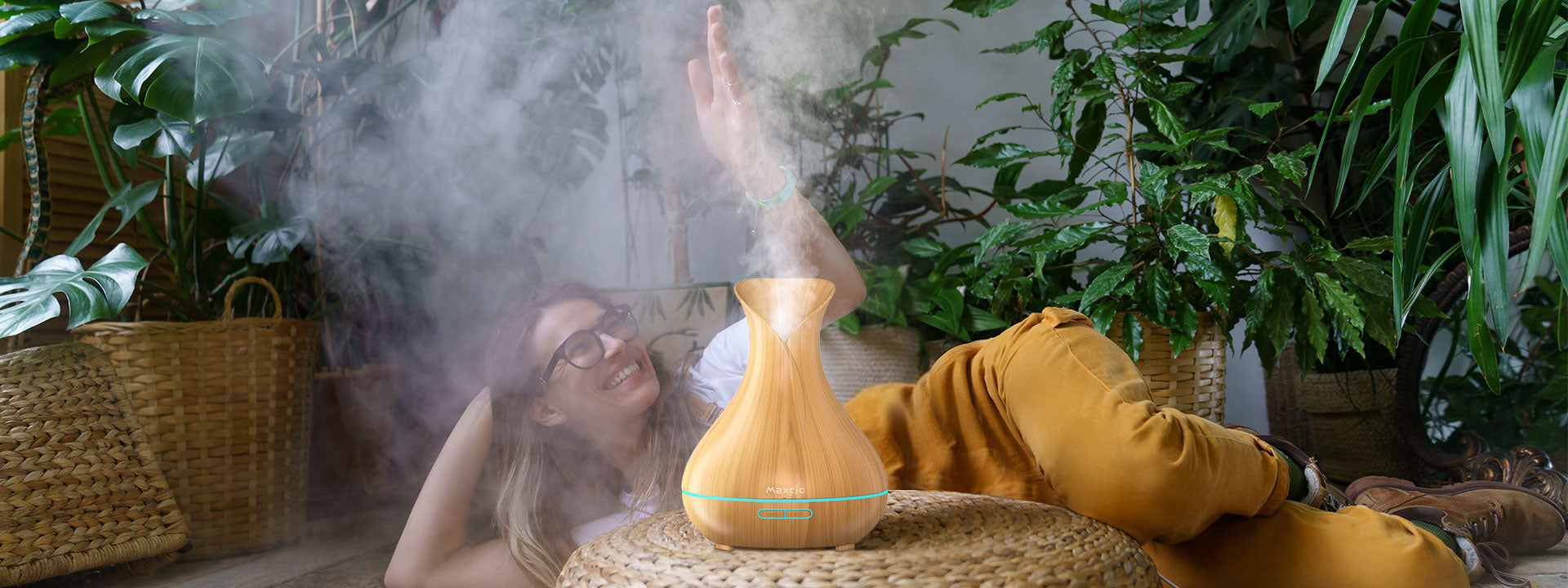Are Essential Oil Diffusers Safe for Plants?
Are essential oil diffusers safe for plants? This is a question that we get asked a lot, and it's one that we wanted to address in this blog post. Read on to learn more!
Did you know that your houseplants can also experience the benefits of aromatherapy? That's right, you can protect your plants against pathogens and bugs by exposing them to the aromas of essential oils. The easiest way to do this is to keep an essential oil diffuser near plants, but you may be wondering, are essential oil diffusers safe for plants? The answer to this question is overwhelmingly positive, so let's get into the details of why essential oil diffusers are safe for plants.
Do Essential Oil Diffusers Hurt Plants?
The idea that essential oil diffusers hurt plants is a complete myth. Essential oil diffusers and the diffuser oils themselves do not hurt plants; in fact, essential oil diffusers can provide a number of therapeutic benefits to your plants. Some of these benefits include:
- Keeping bugs and fungi at bay.
- Adding a healthy looking shine to leaves and branches.
- Encouraging healthy growth.
- Attracting pollinators which will lead to more flowering/fruiting.
- Helping to purify the air that your plants and their soil breathe.
So don't be worried about hurting your plants by using essential oil diffusers or diffuser oils! You're actually helping them stay happy and healthy along with providing therapeutic benefits to you and your family.
How Do You Diffuse Essential Oils for Plant Therapy?
You can diffuse essential oils to create a healthy, therapeutic, and growth promoting environment for plants with an essential oil diffuser. Using an essential oil diffuser is simple, just fill the diffusing container with water and a combination of essential oils. To get the best results from diffusing essential oils for plant therapy, follow these essential tips:
- Use good essential oil combinations like clove, citrus, and lavender oil that will provide an array of the desired effects for both pest control and healthy plant growth.
- The general rule is to have about a 2% solution when diluting your diffuser oils with water to get the best benefits of aromatherapy for your plants, that's about 80 drops for a cup of water. Once you've determined the size of your diffuser's water basin, just add the essential oils accordingly.
- Place the essential oil diffuser near your plants. Don't be afraid of the essential oils poisoning your plants! That won't happen! To ensure that your plants get the most out of the benefits of aromatherapy, keep your essential oil diffuser nestled right in your plant corner with your floral friends.
What Essential Oils Help Plants Grow
Certain types of essential oils do wonders for helping your plants grow - but not how you think! It would be wonderful if there was some magic combination of plant extracts that you could rub on your plants to make them grow bigger and faster, but that's simply impossible to achieve, at least through natural means! That being said, you can optimize your plant's natural ability to grow with essential oils that eliminate factors that contribute to growth stunting.
Another major factor that has an impact on plant growth is the presence of pollinators. Pollinators are little insects like butterflies, bees, moths, birds, or bats that like to visit your plants from time to time to have a snack on flower nectar. In the process of having their snack, they exchange pollen from the other plant visits with the plant they are currently visiting, effectively facilitating the fruiting and reproduction of these plants! Therefore, more pollinators will lead to more plant reproduction, which in turn leads to more plant growth!
With all that said, the best essential oils that help plants grow by reducing external threats and attracting pollinators are
Citrus Oil: Citrus oil is incredibly effective at killing harmful bacteria that can infect indoor plants, but that's not all! Citrus oil also helps purify the air, which is essential for promoting plant growth.
Basil Oil: Basil oil is one of the most potent pollinator attractors. A little bit of basil oil goes a long way to invite bees, butterflies, moths, and other plant-promoting creatures.
Patchouli Oil: If you just want to stick with one oil to take care of all your plant's needs, patchouli oil is the way to go. It has a strong, lovely smell that pollinators love, and does an amazing job at keeping fungi, bacteria, and pests at bay.
Yarrow Oil: Yarrow oil has an incredibly pleasing scent, which is probably why it is also commonly used in soaps and shampoos. Pollinators are sure to visit your plants if they've been spritzed with some yarrow oil, but be sure not to use too much as it is blue in color and can leave blue streaks on your plants.
Tea Tree Oil: Tea tree oil eliminates fungus entirely, even the spores that could be hiding away in the soil. Just make sure you don't over-apply it as it can easily increase the chances of your plants getting a sunburn.
The best way to easily expose your plants to the amazing benefits of essential oil is to use about 80 drops of oil per cup of water. For outdoor plants, it's best to use a plant mister to lightly spray the solution on the plants, especially at the base. For indoor plants, it's most convenient and effective to use an essential oil diffuser as they will regularly inoculate the surrounding air with that therapeutic and plant growth-promoting essential oil solution, keeping your plants healthy and your home smelling wonderful at the same time.
What Essential Oils Keep Bugs Away From Plants
Essential oils are absolutely amazing for keeping bugs away from your plants and can be used as a natural insect repellent for them. According to Science Direct, the reason why essential oils ensure the safety of your plants from insects is due to compounds known as terpenes, which give off an amazing scent and can provide a multitude of health benefits for humans and pollinators, but are utterly intolerable and even toxic for bugs and pests. Some plants developed these compounds as a means of survival as they attract pollinators which greatly encourages fruiting and propagation, and also keeps the bad, plant-killing bugs away. Evolution is so cool!
Seeing as even indoor plants can be subject to bug infestations, like aphids, white flies, spider mites, and mealy bugs. One of the best and healthiest ways to protect your plants against these bugs is to use certain types of essential oils in an essential oil diffuser or apply the oils topically to the surface of your plants. Here are some of the best essential oils for keeping bugs away from plants:
Thyme Oil: One of my personal favorite essential oils for indoor plants - thyme oil has a scent that is reminiscent of Mediterranean cuisine and is absolutely scrumptious to most people - not so much for pathogens and bugs. Bacteria, fungi, and aphids will steer clear of your plants so long as they're smelling of fresh thyme!
Cajeput Oil: Cajeput oil is especially effective at keeping aphids and spider mites away. If you already have an issue with these pests, some cajeput oil-inoculated mist will drive them away.
Clove Oil: Clove oil is a potent anti-fungal substance and is known to keep bigger pests like cockroaches and ants away - it's one of the best essential oils for outdoor plants.
Rosemary Oil: Like thyme, rosemary has a lovely aroma that bugs hate, especially spider mites. If you use an essential oil diffuser, you should regularly use rosemary oil in it to discourage those pesky spider mites and keep your home smelling delicious.
Catnip Oil: Catnip oil is one of the most effective natural insect repellents out there. It works against pretty much all bugs and pests that may come to attack your indoor plants, except one, your cat. It's possible that if you have a cat and you're using catnip oil to protect your plants, your cat might get a little too up close and personal with the plant which could spell disaster for it. So, use catnip oil with caution if you have cats!
When it comes to applying essential oils to your indoor or outdoor plants, you can use a plant mister and apply them topically. Some people prefer to interact with their plants and enjoy the ritual of actively spraying or rubbing the oils on them, but if you are looking for a more hands-off approach to plant care, an essential oil diffuser is a way to go.
Maxcio's smart aroma diffuser can be controlled from your smart device so you can set when and how much essential oil mist you want it to disperse around your plants. It also has three mist modes and will turn off automatically and send you a notification when it needs refilling. For a modern, convenient, and health-promoting approach to personal and plant care, look no further than Maxcio smart aroma diffuser.
In summary, are essential oil diffusers safe for plants? They are not just safe for plants, they are greatly beneficial to their health! But how plants benefit from the aromatherapy experience is only half of the story! There are numerous aromatherapy purposes and essential oil diffusers can provide many more health and environmental benefits to your home - there's simply no wonder why they've become so popular in the last few years. Just take a deep breath of that diffuser oil inoculated air, and relax knowing that your plants are probably feeling the same way.























